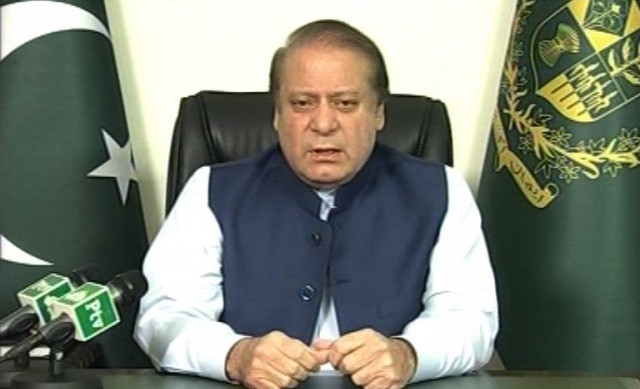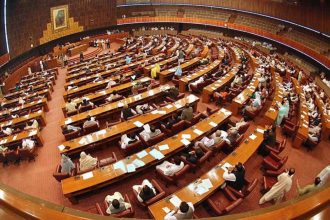Islamabad: Prime Minister Nawaz Sharif has directed the interior ministry to prepare a plan to deweaponise society because a democratic government could not allow armed groups to operate with impunity.
Presiding over a meeting of the cabinet on Monday, he said the Zarb-i-Azb operation was achieving its objectives and the credit went to the armed forces and civilian institutions.
He said even the international community praised the successes achieved in the operation.
The prime minister lauded the efforts and determination of Army Chief General Raheel Sharif and Chief of Air Staff Air Marshal Sohail Aman for leading the operation from the front.
Nisar briefs cabinet on NAP’s implementation status
Mr Sharif said the operation against criminals in Karachi was launched in agreement with all stakeholders and its results were visible.
He said the people of Karachi wanted peace and the government would not allow political expediency to come in the way of restoring peace and traditional tranquillity in the city.
“We cannot even think of taking any step back as far as the Karachi operation is concerned and those who have come to parliament with the people’s mandate should place their grievances and raise issues on the floor of the house.”
The prime minister said the government was committed to implementing the National Action Plan because benefits of its success would reach every corner of the country. He said those involved in sectarianism and those who disseminated hatred, incited militancy and encouraged terrorism would be severely dealt with.
He declared that the terrorists who played with the lives of the people were committing unforgivable crime and would not be spared.
Mr Sharif said the situation in Balochistan had been improving and the process would continue till the dawn of peace and prosperity from Fata to Balochistan and Karachi.
Interior Minister Chaudhry Nisar Ali Khan gave a detailed presentation on the status of National Action Plan.
He informed the meeting that the government was making progress in key elements of the plan and the situation had improved a lot because of sacrifices rendered by armed forces and law-enforcement agencies.
He said the national security policy must not be politicised or used for point-scoring.
He assured the cabinet that no criminal element or terrorist would be spared during implementation of the NAP.
The minister said that the overall security situation in the country had improved considerably and “we will not allow anyone to derail the operation against criminals”.
The prime minister praised the interior minister and expressed the hope that he would continue the mission.
Later briefing newsmen along with Information Minister Pervez Rasheed, the interior minister rejected criticism over implementation of the NAP and said “the figures speak for themselves”.
Chaudhry Nisar said the security situation was gradually improving. “The efforts must not be made controversial or sabotaged.”
He described as baseless rumours about any strain in civil-military relationship and said similar rumours were churned out when the dialogue with the Tehreek-i-Taliban Pakistan had been started.
He said some Taliban prisoners, who were in custody of military agencies, had been freed as a goodwill gesture and an army representative remained present during the talks with the TTP.
The interior minister said thousands of troops were present in all provinces as the third line of defence, but refused to divulge their exact number. They would keep on performing duty till the need was felt and said there was no deadline for their deployment, he added.
He said 2005 was relatively a peaceful year, but 1,444 incidents of terrorism took place in 2006 which rose to 1,820 in 2007, 1,575 in 2008, 1,938 in 2009, 2,061 in 2010, 1,680 in 2011, 1,316 in 2012, 1,571 in 2013 and 1,640 in 2014.
But the number came down to 695 in the first nine months of 2015 and 305 of them were without any loss of life, he added.
Chaudhry Nisar said 62,000 combing operations had been carried out as part of the NAP and about 68,000 people were arrested during this period. He said 5,900 intelligence-based operations had been carried out and their number rose to 11,000 since the launch of Zarb-i-Azb operation.
He said 1,114 terrorists had been killed and 883 hardcore terrorists arrested.
He said names of 7,900 people belonging to proscribed and militant organisations had been placed on a watch list, commonly known as the fourth schedule of Anti-terrorism Act.
He said the number of proscribed organisations was 61, while another organisation (Jamatud Dawa) was under observation. He said 282 leaders of banned outfits had also been identified.
The minister said all networks of terrorists and criminals had been dismantled and they were no more in a position to operate from Pakistan.
According to him, verification of 140 million SIMs was a great achievement and now they were not being used in terrorist and criminal activities.
The interior minister said 2,011 criminals and terrorists had been awarded capital punishment and the process continued. Work on disarming sectarian groups was under way.
He said 28 cases had been decided by military courts, while 46 were under trial. Nine military courts are functioning, but not as a parallel judicial system. He said the military courts would only try ‘jet black terrorists’.
He said the law and order situation in Karachi had improved a lot and major crimes had declined by 70 per cent. The situation had also improved significantly in Balochistan where over 500 outlaws (fararis) had surrendered so far.
A substantive dialogue process is under way and a major breakthrough is imminent. Action would be taken against those involved in sectarian strife, the minister added.
Chaudhry Nisar conceded that the pace of implementation on choking terror financing was slow and only Rs250 million had so far been frozen.
He said during the cabinet meeting he proposed formation of a focused committee. It is not an easy task in a country with unregulated economy; even developed countries have failed to effectively block terror financing.
He said the National Counter-Terrorism Authority needed resources and manpower. The number of its offices was only three, while it should have been 250, he added.
Dialogue with India
The prime minister told the cabinet that any dialogue with India without Kashmir would be futile.
He said that Kashmiri leaders were not the third party but an important party to the issue and any decision about their future could not be taken without consulting them.
Adviser to the PM on National Security and Foreign Affairs Sartaj Aziz briefed the cabinet on the deadlock in talks with India.






